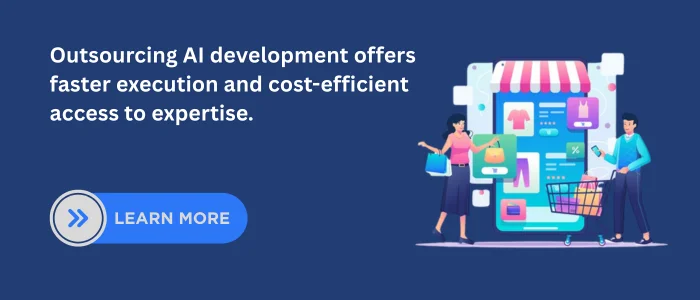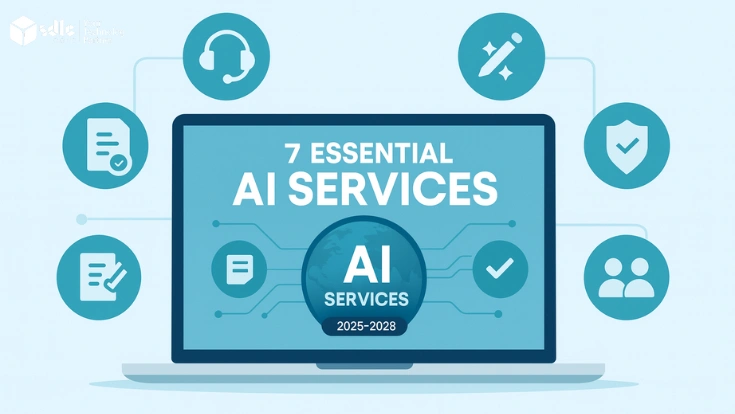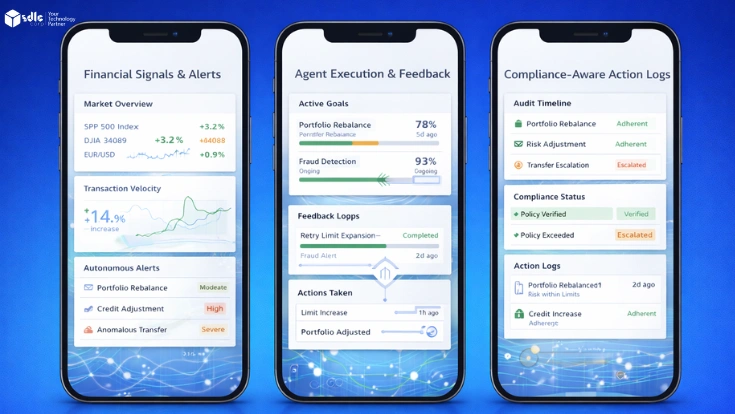Introduction
Artificial Intelligence (AI) is transforming e-commerce, becoming the backbone of modern retail by reshaping operations and enhancing customer experiences. From personalized product recommendations and predictive analytics to AI-powered inventory management, businesses can now deliver faster, smarter, and more seamless shopping experiences.
The global AI in e-commerce market is projected to surpass $19.9 billion by 2030, driven by automation, real-time decision-making, and hyper-personalized shopping journeys. Companies leveraging AI in e-commerce solutions gain a clear competitive advantage improving efficiency, customer retention, and profitability beyond traditional methods. Meeting today’s consumer expectations for instant support and tailored shopping is nearly impossible manually, but AI makes it scalable.
With AI-powered development services including chatbots, supply chain automation, and predictive pricing engines retailers can future-proof their operations. Adopting AI today lays the foundation for sustainable growth and long-term success in tomorrow’s digital-first marketplace. Explore our AI development services for e-commerce
1. Importance of AI in E-Commerce
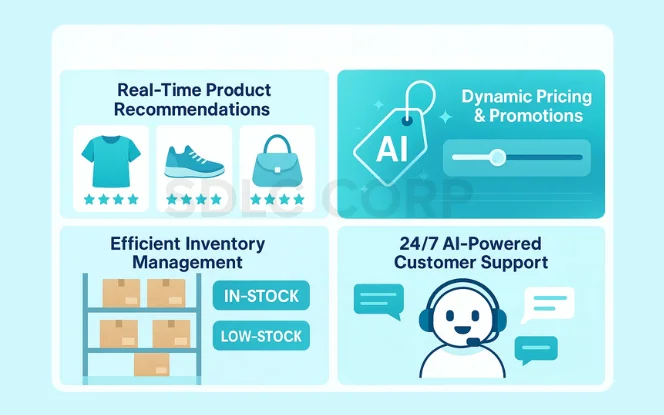
Artificial Intelligence (AI) has become a critical driver of competitive advantage in e-commerce. Businesses adopting AI-powered solutions gain the ability to analyze vast amounts of consumer data, forecast demand accurately, and optimize pricing strategies in real time. Unlike manual processes, which are slow and prone to error, AI in e-commerce enables faster, data-driven decisions that lead to higher conversions, increased revenue, and stronger customer retention.
Meeting Modern Consumer Expectations with AI
Today’s shoppers expect personalized, seamless, and rapid shopping experiences. AI technologies help e-commerce platforms deliver on these expectations by enabling:
Real-Time Product Recommendations
AI algorithms analyze browsing behavior, purchase history, and customer intent to deliver personalized product suggestions. This not only boosts conversions but also drives upselling and cross-selling opportunities.
Dynamic Pricing and Personalized Promotions
Machine learning models adjust pricing automatically by analyzing competitor data, market demand, and individual shopper behavior. This ensures competitive pricing strategies while maximizing profit margins.
Smarter Inventory Management
With AI-driven predictive analytics, businesses can forecast demand, optimize stock levels, and minimize overstock or stockouts. This reduces storage costs and ensures smoother order fulfillment.
24/7 AI-Powered Customer Support
AI chatbots and virtual assistants manage inquiries, resolve common issues, and guide customers throughout their shopping journey. This guarantees round-the-clock support while freeing human agents for complex tasks.
Strategic Advantages of AI in E-Commerce
By strategically implementing AI, e-commerce businesses can:
Anticipate customer needs in real time
Streamline shopping experiences across touchpoints
Provide hyper-personalized engagement
Build long-term loyalty and trust
Business Impact: Companies that integrate AI technologies gain a significant competitive edge, foster customer retention, and achieve sustainable growth in the digital marketplace.
2. Key Benefits of AI for Online Retail
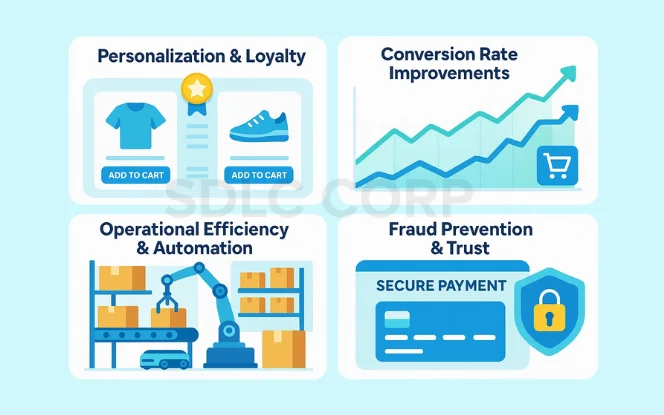
AI technologies are transforming online retail by delivering smarter, faster, and more personalized shopping experiences. Retailers that adopt AI gain a competitive advantage through enhanced customer engagement, streamlined operations, and stronger security
AI-Powered Personalization and Customer Loyalty
By analyzing browsing behavior, purchase history, and customer preferences, AI enables:
Tailored product recommendations
Dynamic website content and promotions
Personalized discounts and loyalty offers
These AI-powered personalization strategies improve customer satisfaction, encourage repeat purchases, and increase lifetime value.
Higher Conversion Rates with AI
AI helps retailers predict user intent and deliver the right products at the right time by optimizing:
Product placement and display order
Dynamic pricing strategies
Targeted marketing campaigns
This precision targeting significantly improves conversion rates, ensuring shoppers are more likely to purchase and engage with promotions.
Operational Efficiency and Retail Automation
AI automates key operational areas in e-commerce, including:
Inventory forecasting and management
Order fulfillment and logistics optimization
Supply chain tracking and automation
Automation reduces human error, lowers costs, and accelerates workflows, enabling businesses to scale efficiently while allowing employees to focus on creative, strategic tasks.
AI Fraud Prevention and Customer Trust
Real-time AI monitoring systems detect suspicious activities by analyzing transaction patterns and unusual behavior. Retailers benefit from:
Faster fraud detection
Automated flagging of high-risk transactions
Enhanced security for customers and businesses
By preventing fraud proactively, AI builds trust, protects profits, and strengthens brand reputation.
Advisory and Governance for E-commerce AI
AI systems in e-commerce influence pricing, visibility, and customer experience, making governance essential. Advisory input helps define acceptable automation boundaries and evaluation criteria. An AI consulting company may support strategy alignment, risk assessment, and policy design for responsible AI use.
3. Personalized Shopping Experiences with AI in E-Commerce
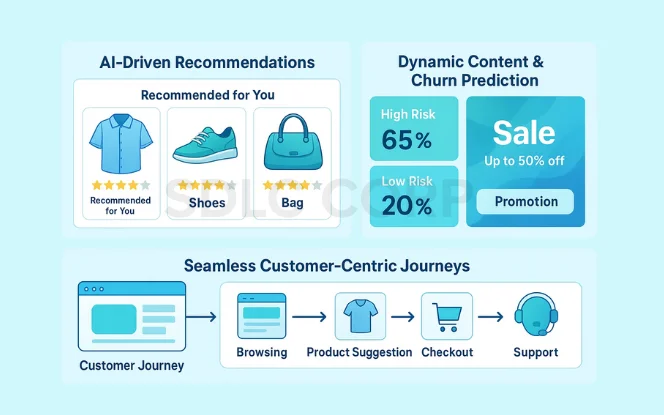
AI is reshaping how customers engage with online stores by delivering highly personalized shopping experiences. Using machine learning, predictive analytics, and data-driven insights, e-commerce platforms can anticipate user preferences and present relevant products, offers, and content in real time — creating more intuitive and engaging shopping journeys.
AI-Driven Product Recommendations
Intelligent recommendation engines analyze:
Browsing history
Purchase patterns
Customer preferences
to suggest products that match individual interests.
Business Impact:
Stronger user engagement
Higher upselling and cross-selling opportunities
Increased customer loyalty and repeat purchases
Dynamic Content Personalization and Churn Prediction
AI dynamically adapts:
Website content and product displays
Promotional banners and offers
Email campaigns and retargeting ads
Predictive models also identify users at risk of churn, enabling businesses to re-engage them with personalized offers or incentives.
Business Impact:
Improved retention rates
Higher customer lifetime value (CLV)
Reduced churn through proactive engagement
Seamless, Customer-Centric Journeys
By integrating AI-powered personalization, e-commerce brands can deliver a seamless and customer-centric journey. Every interaction becomes smarter, more relevant, and aligned with individual expectations.
Business Impact:
Higher customer satisfaction
Long-term brand loyalty
Significant revenue growth
Enterprise-Scale AI Platforms for Online Retail
Large retailers operate across multiple channels, regions, and brands. Enterprise-scale AI platforms centralize analytics while supporting localized configurations. Architectural approaches used by an enterprise AI development company are often referenced when designing scalable e-commerce intelligence systems.
4. Conversational AI: Chatbots & Virtual Assistants in E-Commerce
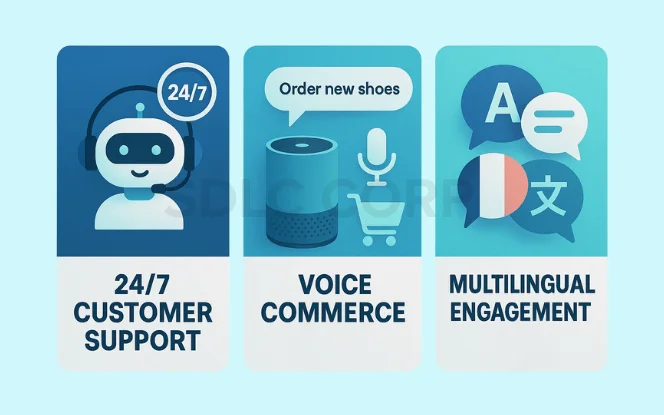
Conversational AI is transforming how e-commerce businesses interact with customers, making communication instant, personalized, and highly efficient. Through AI-powered chatbots and virtual assistants, brands can streamline customer support, boost engagement, and operate 24/7 without constant human intervention.
AI Chatbots for 24/7 Customer Support
Chatbots powered by AI provide instant responses to customer queries, handle routine issues, and guide shoppers through the purchasing process anytime, anywhere.
Key Benefits:
Reduced response times and faster issue resolution
Lower customer service costs
Higher customer satisfaction and loyalty
Business Impact: Round-the-clock support ensures customers always get the help they need.
Voice Commerce with Virtual Assistants
Virtual assistants with voice recognition technology allow shoppers to:
Search for products
Place orders
Make secure payments
This hands-free, intuitive shopping experience is especially powerful for mobile users who value speed and convenience.
Business Impact: Enhanced accessibility, frictionless checkouts, and higher conversion rates.
Multilingual Virtual Assistants for Global Engagement
AI-driven multilingual systems break geographical barriers by supporting multiple languages. They maintain personalized, localized communication, ensuring global audiences feel valued.
Key Benefits:
Expanded international reach
Localized interactions without losing personalization
Stronger brand presence in global markets
Business Impact: Wider audience engagement and easier global expansion.
Final Thoughts
By integrating conversational AI tools like chatbots and virtual assistants, e-commerce businesses can:
Deliver faster, more efficient customer support
Enable voice-driven, hands-free shopping
Communicate with a global audience in multiple languages
These innovations boost customer loyalty, increase operational efficiency, and unlock new growth opportunities in the competitive digital marketplace.
5. AI in Search, Pricing & Supply Chain for E-Commerce
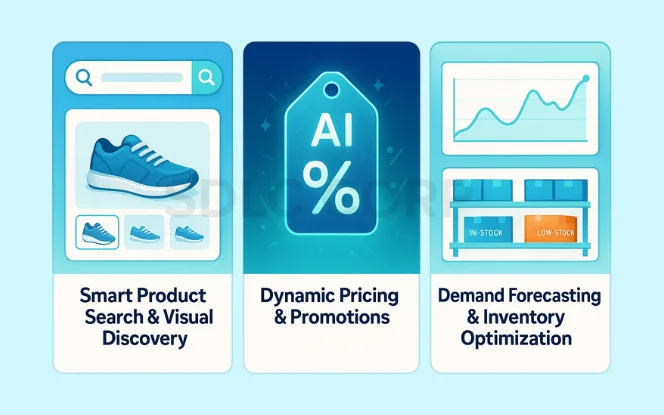
AI is revolutionizing e-commerce operations by optimizing product discovery, pricing strategies, and supply chain management. Its data-driven capabilities enhance efficiency, reduce costs, and deliver seamless shopping experiences that build customer loyalty.
Smart Product Search and Visual Discovery
AI-powered search engines and image recognition tools help customers find products quickly whether through keywords, filters, or images.
Key Benefits:
More accurate search results
Personalized product discovery
Visual search for mobile-first shoppers
Business Impact: Improved engagement, higher conversion rates, and effortless product discovery.
Dynamic Pricing and AI-Driven Promotions
Machine learning algorithms continuously analyze market trends, competitor pricing, and customer behavior to set optimal prices.
Key Benefits:
Real-time price adjustments
Personalized discounts and promotions
Competitive pricing that maximizes revenue
Business Impact: Increased profitability and stronger conversion rates.
AI in Demand Forecasting and Inventory Optimization
Predictive analytics enables businesses to forecast demand with high accuracy by analyzing historical sales, seasonal trends, and market shifts.
Key Benefits:
Optimized inventory levels
Fewer stockouts and reduced overstocking
Streamlined supply chain operations
Business Impact: Lower operational costs, reduced waste, and improved customer satisfaction.
Final Thoughts
By integrating AI in search, pricing, and supply chain management, e-commerce businesses can boost efficiency, maximize revenues, and deliver smarter, more responsive shopping experiences. Companies that adopt these solutions early will secure a sustainable competitive edge in the fast-evolving digital marketplace.
Partner with AI experts to optimize your e-commerce operations
6. AI in Marketing, Advertising & Content for E-Commerce
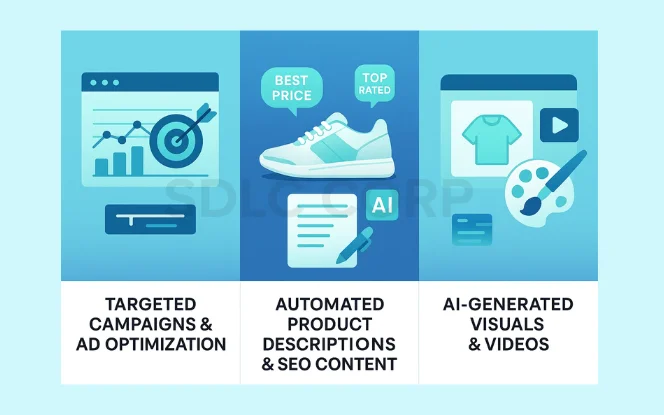
AI is transforming e-commerce marketing by enabling hyper-targeted campaigns, automated content creation, and visually engaging advertising that resonates with audiences. These innovations help brands improve conversions, maximize ROI, and stay competitive in the digital-first marketplace.
Targeted Campaigns and AI Ad Optimization
AI analyzes customer behavior and purchase patterns to create hyper-personalized marketing campaigns. Automated ad optimization ensures budgets are spent effectively while boosting engagement.
Key Benefits:
Precise audience segmentation
Predictive buying behavior analysis
Personalized ad delivery across channels
Business Impact: Higher ad ROI, improved conversion rates, and reduced customer acquisition costs.
Automated Product Descriptions and SEO Content
AI-powered tools generate product descriptions and SEO-optimized content at scale, saving marketing teams hours of manual work while boosting visibility in search results.
Key Benefits:
Compelling product copy created instantly
Keyword-rich SEO content to improve rankings
Scalable content generation for large catalogs
Business Impact: Improved organic traffic, better search rankings, and faster go-to-market campaigns.
AI-Generated Visuals and Video Advertising
From dynamic product images to promotional videos, AI-generated visuals strengthen omnichannel marketing strategies by delivering engaging, cost-efficient creative assets.
Key Benefits:
Auto-generated product visuals
Video ads tailored to audience preferences
Consistent branding across digital channels
Business Impact: Higher engagement, better brand recall, and improved campaign efficiency.
By integrating AI in marketing, advertising, and content strategies, e-commerce businesses can:
Boost customer engagement
Increase sales conversions
Reduce content creation costs
Gain a long-term competitive advantage
Retailers seeking an all-in-one solution can explore How Odoo Streamlines Retail and E-Commerce to optimize workflows across marketing, supply chain, and inventory.
7. Real-World AI Tools & Platforms for E-Commerce
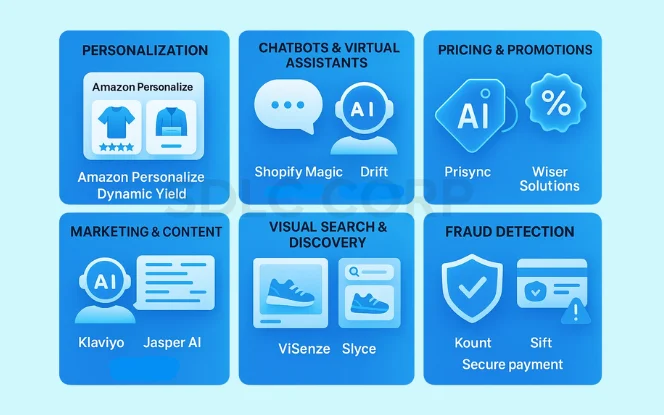
AI-powered platforms are essential for implementing advanced e-commerce solutions. They enable businesses to deliver personalized experiences, automate operations, optimize pricing, and streamline marketing efforts — all while improving efficiency and profitability.
Key AI Tools Across E-Commerce Functions:
| Function | Tools & Platforms | Key Features |
|---|---|---|
| Personalization | Amazon Personalize, Dynamic Yield | Product recommendations, behavioral targeting |
| Chatbots & Assistants | Shopify Magic, Drift, Intercom | 24/7 support, automated responses, customer engagement |
| Pricing & Promotions | Prisync, Wiser Solutions | Dynamic pricing, discount optimization |
| Marketing & Content | Klaviyo, Jasper AI, Copy.ai | Email campaigns, SEO content, AI-generated text |
| Visual Search | ViSenze, Slyce | Image-based product search, visual recommendations |
| Fraud Detection | Kount, Sift | Transaction monitoring, fraud prevention |
Business Impact of AI Tools in E-Commerce
Personalization platforms increase engagement and boost conversion rates.
AI chatbots provide instant, round-the-clock customer support.
Dynamic pricing tools optimize discounts to maximize margins.
AI-driven marketing software scales campaigns and content creation.
Visual search platforms enhance product discovery for mobile-first shoppers.
Fraud detection systems protect revenues and build customer trust.
Result: Businesses achieve scalable growth, stronger customer experiences, and data-driven decision-making.
Blockchain Developers in E-Commerce: Enhancing Customer Experiences to see how blockchain can complement AI in securing transactions and building transparency.
8. Implementation Roadmap & Challenges in AI for E-commerce
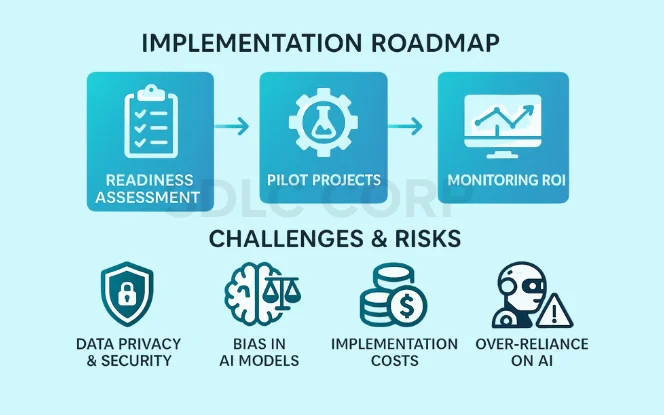
Implementing AI in e-commerce requires a structured strategy to ensure effective adoption, measurable results, and sustainable growth. By following a clear roadmap and addressing common risks, businesses can maximize AI benefits while avoiding pitfalls.
AI Implementation Roadmap for E-commerce
1. Readiness Assessment
Evaluate business processes, data quality, and technical infrastructure to determine AI adoption potential.
2. Pilot Projects
Start small with AI pilots such as chatbots, personalized recommendation engines, or demand forecasting tools to test impact and collect insights.
3. Monitoring ROI
Track metrics like conversion rates, operational efficiency, and customer engagement to measure success and guide optimization.
Business Impact: A phased approach reduces risks, validates early wins, and ensures scalable adoption.
Key Challenges and Risks in AI Adoption
1. Data Privacy & Security
Ensuring customer data protection and compliance with regulations like GDPR and CCPA.
2. Bias in AI Models
Avoiding biased outcomes that could negatively affect decision-making or customer trust.
3. Implementation Costs
High initial investment in tools, training, and infrastructure can slow adoption.
4. System Integration
Aligning AI solutions with existing platforms (ERP, CRM, e-commerce sites) without disrupting workflows.
Business Impact: Identifying and mitigating risks builds resilience and ensures responsible AI adoption.
Explore This: Top AI Services and Tools Every Business Will Need in the Next 3 Years
9. Future of AI in E-commerce
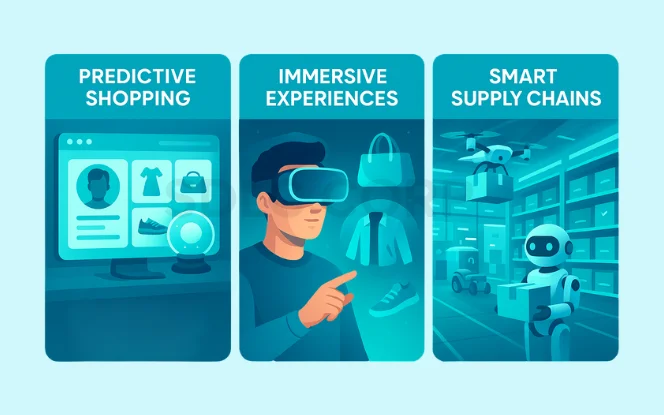
Cutting-edge AI technologies are reshaping the future of e-commerce, delivering smarter operations and innovative shopping experiences. From generative AI in content creation to AR/VR shopping experiences, these innovations empower brands to stay competitive in a digital-first world.
Generative AI in E-commerce
Generative AI will transform content creation and product design, helping businesses scale faster.
Key Applications:
Dynamic visuals for product catalogs
Personalized designs tailored to customer preferences
AI-generated product descriptions and marketing copy
Business Impact: Faster content production, stronger brand storytelling, and higher customer engagement.
Read more : AI-Powered Supply Chain Optimization for Retail & E-commerce
Hyper-Personalization with AI Agents
AI agents anticipate customer needs by delivering real-time, personalized experiences.
Examples:
Tailored product recommendations
Individualized offers and discounts
Context-aware, conversational shopping interactions
Business Impact: Improved customer loyalty, stronger engagement, and higher conversion rates.
Voice Commerce and Multimodal Shopping
AI is making voice-assisted and multimodal shopping mainstream. Customers will interact using voice, touch, and visuals for seamless experiences.
Benefits:
Hands-free shopping through voice assistants
Faster checkout for mobile users
More accessible e-commerce for diverse customers
Business Impact: Convenience, wider reach, and faster purchasing decisions.
AR/VR for Immersive Online Shopping
AR and VR technologies bridge the gap between online and offline shopping.
Key Applications:
Virtual try-ons for fashion and accessories
3D immersive product exploration
Interactive virtual stores
Business Impact: Increased buyer confidence, reduced returns, and more engaging shopping journeys.
Beyond customer experiences, AI in supply chain management enhances forecasting and operations.
Key Advantages:
Smarter demand forecasting
Automated inventory management
End-to-end supply chain visibility
Business Impact: Reduced costs, fewer stockouts, and greater operational efficiency.
The future of AI in e-commerce will focus on hyper-personalization, immersive shopping, and intelligent operations. Companies that strategically adopt these innovations will achieve sustainable competitive advantage, combining customer-centric experiences with operational excellence.
Partner with AI development experts to future-proof your e-commerce business
Conclusion
Artificial Intelligence (AI) is revolutionizing e-commerce by enabling sales growth, operational efficiency, and improved customer satisfaction. Businesses that adopt AI early gain a competitive edge through personalized shopping experiences, smarter decision-making, and automated workflows. However, successful AI integration requires more than technology it demands strategic planning, data privacy compliance, ethical practices, and alignment with business objectives.
By embracing AI thoughtfully, e-commerce brands can future-proof operations, stay ahead of digital market trends, and deliver exceptional value to customers. For organizations seeking expert support, advanced AI development services provide tailored solutions that ensure effective, scalable, and sustainable AI adoption.
FAQs
1. What is AI in e-commerce?
AI in e-commerce refers to technologies that enable online retailers to automate processes, personalize customer experiences, optimize pricing, and make data-driven decisions.
2. How does AI improve customer experience?
AI delivers personalized product recommendations, dynamic content, 24/7 support through chatbots, and predictive services that anticipate customer needs.
3. Which areas of e-commerce benefit most from AI?
Key areas include personalization, marketing, pricing optimization, supply chain management, fraud detection, search, and visual product discovery.
4. What are the challenges of implementing AI in e-commerce?
Challenges include data privacy, algorithmic bias, integration with existing systems, high initial costs, and over-reliance on automated processes.
5. Can small businesses use AI effectively?
Yes. Scalable AI tools and platforms allow small and medium-sized businesses to leverage automation, personalization, and marketing optimization without extensive technical resources.
6. What is the future of AI in online retail?
The future includes generative AI for content and design, hyper-personalized shopping, voice commerce, AR/VR experiences, and responsible AI practices aligned with regulatory guidelines

